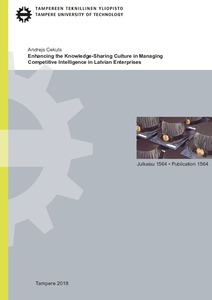Enhancing the Knowledge-Sharing Culture in Managing Competitive Intelligence in Latvian Enterprises
Cekuls, Andrejs (2018)
Cekuls, Andrejs
Tampere University of Technology
2018
Talouden ja rakentamisen tiedekunta - Faculty of Business and Built Environment
This publication is copyrighted. You may download, display and print it for Your own personal use. Commercial use is prohibited.
Julkaisun pysyvä osoite on
https://urn.fi/URN:ISBN:978-952-15-4202-2
https://urn.fi/URN:ISBN:978-952-15-4202-2
Tiivistelmä
Nowadays, organisations work in a very dynamic environment; in the economic context of the 21st century, rapid development of information occurs, and knowledge becomes an essential issue. Consequently, in order to ensure a competitive advantage, organisations should be capable of improving their internal processes in order to accumulate and analyse the necessary information, and make managerial decisions.
However, formal activities do not encourage knowledge sharing within the organisation, which has been demonstrated in various ways in a number of prior studies.
Thus, the main objective of this dissertation is to identify the organisation's factors that affect the creation and sharing of knowledge within organisations as well as within the process of competitive intelligence. An important aspect is the attitudes of supervisors and subordinates toward operational activities a) within a group as well as b) interaction with other groups within an organisation. It is necessary to reduce the difference of opinions by 1) improving communication and 2) related management processes in order for the organisation to have higher probabilities of competitive success.
This dissertation explores the values of an organisational culture and the factors affecting implementation of knowledge sharing in enterprises, accounting for the scale of values and the social value system of both employees and supervisors in the organisation. Values and corresponding behaviour should be reflected in any aspect of group structures, systems and processes.
A mixed research design was used, in order to leverage data gathered by and analyzed using both qualitative and quantitative research. The results showed that the knowledge-sharing culture in managing competitive Intelligence in Latvian enterprises is affected by several factors. Employees are willing to share knowledge with people whom they trust. However, the findings revealed contradictions in the views of employees and supervisors regarding the role of organisational trust with regard to knowledge sharing. In order to effectively develop the CI process, it is important to identify the desired distribution of cultural values. Leaders in the enterprise should be aware of which values of organisational relationships will contribute to the smooth progress of CI.
However, formal activities do not encourage knowledge sharing within the organisation, which has been demonstrated in various ways in a number of prior studies.
Thus, the main objective of this dissertation is to identify the organisation's factors that affect the creation and sharing of knowledge within organisations as well as within the process of competitive intelligence. An important aspect is the attitudes of supervisors and subordinates toward operational activities a) within a group as well as b) interaction with other groups within an organisation. It is necessary to reduce the difference of opinions by 1) improving communication and 2) related management processes in order for the organisation to have higher probabilities of competitive success.
This dissertation explores the values of an organisational culture and the factors affecting implementation of knowledge sharing in enterprises, accounting for the scale of values and the social value system of both employees and supervisors in the organisation. Values and corresponding behaviour should be reflected in any aspect of group structures, systems and processes.
A mixed research design was used, in order to leverage data gathered by and analyzed using both qualitative and quantitative research. The results showed that the knowledge-sharing culture in managing competitive Intelligence in Latvian enterprises is affected by several factors. Employees are willing to share knowledge with people whom they trust. However, the findings revealed contradictions in the views of employees and supervisors regarding the role of organisational trust with regard to knowledge sharing. In order to effectively develop the CI process, it is important to identify the desired distribution of cultural values. Leaders in the enterprise should be aware of which values of organisational relationships will contribute to the smooth progress of CI.
Kokoelmat
- Väitöskirjat [4773]
